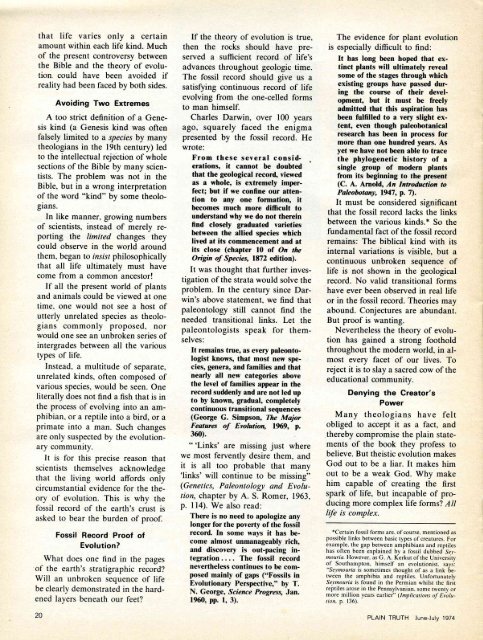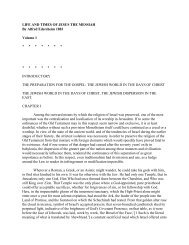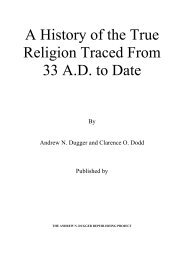Create successful ePaper yourself
Turn your PDF publications into a flip-book with our unique Google optimized e-Paper software.
that life varies only a certain<br />
amount within each life kind. Much<br />
of the present controversy between<br />
the Bible and the theory of evolution.<br />
could have been avoided if<br />
reality had been faced by both sides.<br />
Avoiding Two Extremes<br />
A too strict definition of a Genesis<br />
kind (a Genesis kind was often<br />
falsely limited to a species by many<br />
theologians in the 19th century) led<br />
to the intellectual rejection of whole<br />
sections of the Bible by many scientists.<br />
The problem was not in the<br />
Bible. but in a wrong interpretation<br />
of the word "kind" by some theologIans.<br />
In like manner. growing numbers<br />
of scientists, instead of merely reporting<br />
the limited changes they<br />
could observe in the world around<br />
them. began to insist philosophically<br />
that all life ultimately must have<br />
<strong>com</strong>e from a <strong>com</strong>mon ancestor!<br />
If all the present world of plants<br />
and animals could be viewed at one<br />
time. one would not see a host of<br />
utterly unrelated species as theologians<br />
<strong>com</strong>monly proposed. nor<br />
would one see an unbroken series of<br />
intergrades between all the various<br />
types of life.<br />
Instead. a multitude of separate,<br />
unrelated kinds. often <strong>com</strong>posed of<br />
various species. would be seen. One<br />
literally does not find a fish that is in<br />
the process of evolving into an amphibian.<br />
or a reptile into a bird. or a<br />
primate into a man. Such changes<br />
are only suspected by the evolutionary<br />
<strong>com</strong>munity.<br />
It is for this precise reason that<br />
scientists themselves acknowledge<br />
that the living world affords only<br />
circumstantial evidence for the theory<br />
of evolution. This is why the<br />
fossil record of the earth's crust is<br />
asked to bear the burden of pr~of.<br />
Fossil Record Proof of<br />
Evolution?<br />
What does one find in the pages<br />
of the earth's stratigraphic record?<br />
Will an unbroken sequence of life<br />
be clearly demonstrated in the hardened<br />
layers beneath our feet?<br />
20<br />
If the theory of evolution is true,<br />
then the rocks should have preserved<br />
a sufficient record of life's<br />
advances throughout geologic time.<br />
The fossil record should give us a<br />
satisfying continuous record of life<br />
evolving from the one-celled forms<br />
to man himself.<br />
Charles Darwin, over 100 years<br />
ago, squarely faced the enigma<br />
presented by the fossil record. He<br />
wrote:<br />
From these several considerations,<br />
it cannot be doubted<br />
that the geological record, viewed<br />
as a whole, is extremely imperfect;<br />
but if we confine our attention<br />
to anyone formation, it<br />
be<strong>com</strong>es much more difficult to<br />
understand why we do not therein<br />
find closely graduated varieties<br />
between the allied species which<br />
lived at its <strong>com</strong>mencement and at<br />
its close (chapter 10 of On the<br />
Origin of Species, 1872 edition).<br />
It was thought that further investigation<br />
of the strata would solve the<br />
problem. In the century since Darwin's<br />
above statement, we find that<br />
paleontology still cannot find the<br />
needed transitional links. Let the<br />
paleontologists speak for themselves:<br />
It remains true, as every paleontologist<br />
knows, that most new species,<br />
genera, and families and that<br />
nearly all new categories above<br />
the level of families appear in the<br />
record suddenly and are not led up<br />
to by known, gradual, <strong>com</strong>pletely<br />
continuous transitional sequences<br />
(George G. Simpson, The Major<br />
Features of Evolution, 1969, p.<br />
360).<br />
"'Links' are missing just where<br />
we most fervently desire them, and<br />
it is all too probable that many<br />
'links' will continue to be missing"<br />
(Genetics, Paleontology and Evolution,<br />
chapter by A. S. Romer, 1963.<br />
p. 114). We also read:<br />
There is no need to apologize any<br />
longer for the poverty of the fossil<br />
record. In some ways it has be<strong>com</strong>e<br />
almost unmanageably rich,<br />
and discovery is out-pacing integration<br />
. . .. The fossil record<br />
nevertheless continues to be <strong>com</strong>posed<br />
mainly of gaps ("Fossils in<br />
Evolutionary Perspective," by T.<br />
N. George, Science Progress, Jan.<br />
1960, pp. 1, 3).<br />
The evidence for plant evolution<br />
is especially difficult to find:<br />
It has long been hoped that extinct<br />
plants will ultimately reveal<br />
some of the stages through which<br />
existing groups have passed during<br />
the course of their development,<br />
but it must be freely<br />
admitted that this aspiration has<br />
been fulfilled to a very slight extent,<br />
even though paleobotanical<br />
research has been in process for<br />
more than one hundred years. As<br />
yet we have not been able to trace<br />
the phylogenetic history of a<br />
single group of modern plants<br />
from its beginning to the present<br />
(c. A. Arnold, An Introduction to<br />
Paleobotany, J947, p. 7).<br />
It must be considered significant<br />
that the fossil record lacks the links<br />
between the various kinds. * So the<br />
fundamental fact of the fossil record<br />
remains: The biblical kind with its<br />
internal variations is visible, but a<br />
continuous unbroken sequence of<br />
life is not shown in the geological<br />
record. No valid transitional forms<br />
have ever been observed in real life<br />
or in the fossil record. Theories may<br />
abound. Conjectures are abundant.<br />
But proof is wanting.<br />
Nevertheless the theory of evolution<br />
has gained a strong foothold<br />
throughout the modem world, in almost<br />
every facet of our lives. To<br />
reject it is to slay a sacred cow of the<br />
educational <strong>com</strong>munity.<br />
Denying the Creator's<br />
Power<br />
Many theologians have felt<br />
obliged to accept it as a fact, and<br />
. thereby <strong>com</strong>promise the plain statements<br />
of the book they profess to<br />
believe. But theistic evolution makes<br />
God out to be -a liar. It makes him<br />
out to be a weak God. Why make<br />
him capable of creating the first<br />
spark of life, but incapable of producing<br />
more <strong>com</strong>plex life forms? All<br />
life is <strong>com</strong>plex.<br />
'Certain fossil forms are. of course. mentioned as<br />
possible links between basic types of creatures. For<br />
example. the gap between amphibians and reptiles<br />
has often been explained by a fossil dubbed Ser·<br />
mal/ria. However. as G. A. Kerkut of the University<br />
of Southampton. himself an evolutionist. says:<br />
"Sevmouria is sometim es thought of as a link be·<br />
tween the amphibia and reptiles. Unfortunately<br />
Sevmouria is found in the Permian whilst the first<br />
reptiles arose in the Pennsylvanian. some twenty or<br />
more million years earli er" (lmplicarions of Evolu·<br />
rion. p. 136).<br />
PLAIN TRUTH June-July 1974












